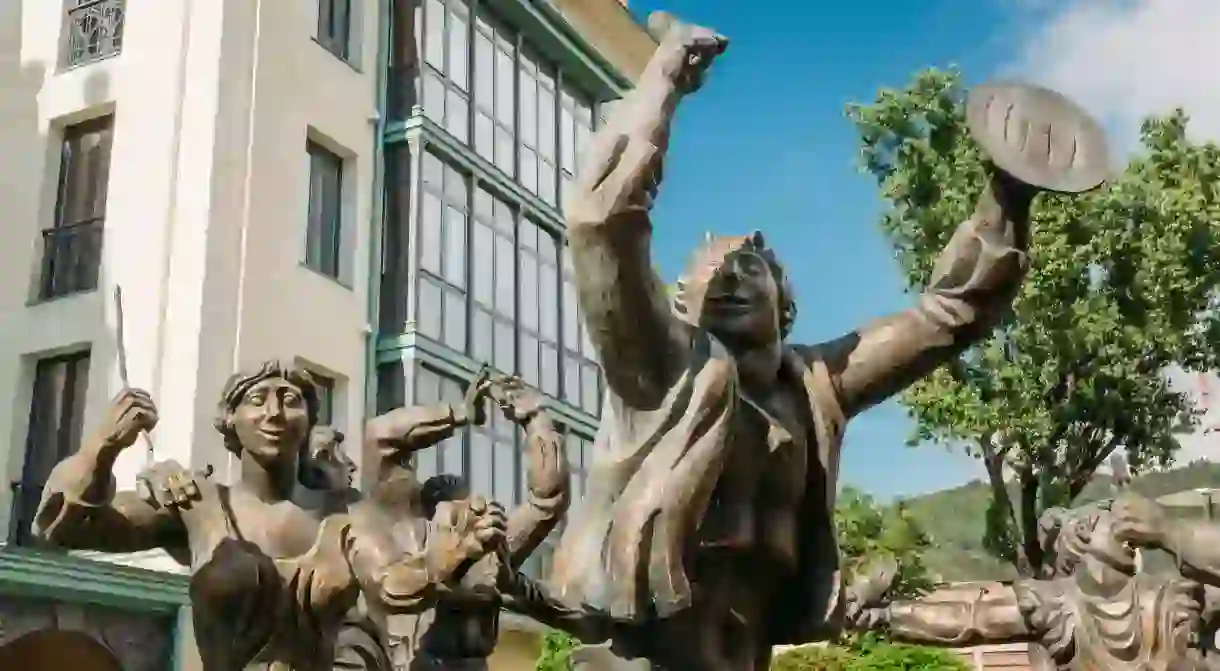The Best Things to See and Do in Tbilisi, Georgia

Tbilisi, the capital of Georgia, has undergone many alterations since being founded in the 5th century CE. Due to the geographical location, Tbilisi is neither Asian nor European; it’s a combination of both. Old and modern blend with each other here as well, making this a fascinating place to explore. Here are some of the best things that you can see and do here.
Wander through the Old Town

Abanotubani, the old town of Tbilisi, is the central historical landmark of the city. It’s here where King Vaghtang Gorgasali’s falcon fell in hot water during his hunt. The accident led to the discovery of natural sulfur hot springs and, later on, to the establishment of the capital. The name of the capital, Tbilisi, is also connected to the story; tbili means warm in Georgian.
The oldest district of the capital offers various attractions for you to explore, such as the Narikala Fortress, Metechi Bridge, Mother of Georgia, Botanical Garden, old residential buildings and much more. You can enjoy a guided tour as part of Culture Trip’s nine-day small-group Georgia trip, led by our Local Insider.
Try a traditional Georgian spa

No trip to Tbilisi is complete until you visit the sulfur baths. They’re easy to spot from a distance; brick domes rise from the ground and feature a small window for light and ventilation. Don’t worry, though; no one will be able to see anything through that window.
The water, naturally hot at 40C (104F), has therapeutic minerals good for your skin and health. You can also book a masseuse, for an additional cost, to give your skin a good scrubbing.
Discover the Georgian Archaeological Treasury

The Simon Janashia Museum on Rustaveli Avenue holds a unique and fascinating exhibition all year round – one that highlights centuries-old treasures found during various archaeological digs in different parts of the country. Here you can see jewels and Georgian gold pieces from three distinct periods of development and history. The items on exhibit here date all the way back to the 3rd century BCE to the 4th century CE.
Visit the Georgian Stonehenge

Chronicles of Georgia, or Georgian Stonehenge as locals jokingly call it, is a 30m-tall (98ft) pillar outside of the city centre. The monument depicts Georgian kings, heroes and queens, while the bottom shows biblical scenes. It’s most likely that you’ll be alone at the memorial, so take advantage of it; explore the site and take Instagram-calibre pictures from different angles.
Hunt down painted hallways

Tbilisi hides some beautiful Art Nouveau architecture from the 20th century. When Georgia was forced to enter the Soviet Union in 1921, such buildings were declared bourgeoisie and banned, resulting in the disappearance of many. However, some still survive.
This experience allows you to see the artistic side of Tbilisi, scattered in many districts of the capital. Many of these buildings, however, are residential houses; therefore, you need to be buzzed in.
Learn About Niko Pirosmani

Often referred to by locals as Nikala, Niko Pirosmani was a primitivist painter who received recognition only after his death. Social conditions of his time influenced his works, which depict merchants, workers, shopkeepers and noblemen. Unlike some other artists, his works never aimed towards perfect imitation of nature and never paid attention to details. The National Gallery located at 11 Shota Rustaveli Avenue exhibits some of his well-known pieces. Also, you can visit his house-museum at 29 Niko Pirosmani Street, where he spent the last years of his life.
Visit the mansion of a famous Georgian entrepreneur

Today it’s the Writer’s House, but it was once the mansion of David Sarajishvili: a doctor of chemistry and philosophy, a philanthropist and the founder of Georgian brandy, Sarajishvili. The German architect Carl Zaar built the house in 1905, and it’s a perfect example of Art Nouveau architecture. Half of it is still under construction, but you can explore the ground floor and the garden. The main hall features photos of Sarajishvili, his family and Georgian poets of that time, while the terrace has ceramic tiles that Villeroy & Boch Company made specifically for him.
Enjoy panoramic views

Take a ride on the Funicular to Mtatsminda Park to relish in panoramic views of the city. The amusement park sits at the top of Mount Mtatsminda; it features different carousels, a roller coaster, a Ferris wheel, water slides and much more. If you feel fancy, you can even have dinner at the Funicular Restaurant and witness a breathtaking vista over an illuminated Tbilisi.
Visit the flea market on Dry Bridge

This unique flea market bears a fascinating collection of jewellery, antiques, vintage home accessories and Soviet bric-a-brac. Locals used to come here to sell their belongings to make a little cash. It turned into the primary business for some people, and those who don’t want to throw something away bring it here and sell it to the merchants.
Goods are laid out on the ground, perfectly lined out and jam-packed on a blanket. Prices may be overinflated, especially for tourists. Try to do some bargaining, or if you happen to have a local friend, ask them to buy it for you. The market is open daily if the weather is good. More sellers emerge on the weekends, but it also means more people visit it.













